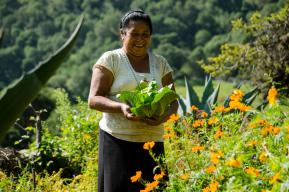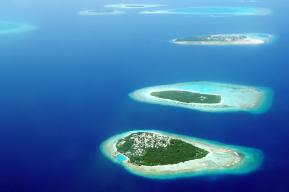Article
Ceremony stresses leadership of 30 exceptional young female scientists

So began the ceremony on the evening of 22 June dedicated to celebrating 30 young women from almost as many countries who had been recognized as International Rising Talents of the L’Oréal-UNESCO For Women in Science Programme in 2020 and 2022 for the exceptional quality of their research. Their wide areas of interest range from green technologies of tomorrow like hydrogen fuel cells and third-generation solar cells to new materials like ecological alternatives to plastics, the study of marine bacteria which can consume plastics floating in the ocean, the protection of bee colonies, the development of quantum technologies, the study of one of the greatest research challenges posed by the COVID-19 pandemic and the exploration of galaxies.
The award ceremony had been postponed for two years by the COVID-19 pandemic, the first interruption in an annual cerebration that had begun more than two decades ago when UNESCO and the Fondation L’Oréal first launched their partnership.
Alexandra Palt, CEO of the Fondation L’Oréal and its Chief Corporate Responsibility Officer of L'Oréal, recalled that the L’Oréal-UNESCO Programme for Women in Science was changing systems that had been built not to include women.
Even today, only one in three researchers is a woman, according to the UNESCO Science Report, and the presence of women becomes increasingly rarefied as they move up the career ladder, be in academia or the private sector. Ms Palt thanked the young women before her for their leadership.
‘We know that the world is facing pressing and urgent challenges’, she said. ‘To find solutions, we will need your expertise, your capacity for innovation’.
The paradox of discrimination in science
Ms Palt then moderated a discussion with three of the awardees on the theme of how to balance competition and cooperation in the research world. Dr Elizabeth Trembath-Reichert from the USA, who studies extremophiles capable of thriving in a living space two and a half kilometres under the sea floor, observed that the ability of women to engage effectively in interdisciplinarity was often hampered by the fact that leadership roles eluded them.
Dr Lina Dahabiyeh from Jordan, who has developed new wound dressings for diabetics which accelerate the healing process, mentioned that some collaborators might initially be dubious about collaboration with a woman because of her life commitments but that, once they saw that you could perform research to a high standard, their attitude changed.
Dr Patrícia Medeiros from Brazil, who studies the relationship between humans and plants, with a particular focus on understanding how people in urban Brazil could be encouraged to consume edible wild plants, concurred with Dr Lina Dahabiyeh. ‘I know many women who had kids and gave up their research career’, she said. ‘Women need more support to have their children and remain in academia. It is not only about institutional change. It is also about societal change. Most of these women have partners who could share the childcare’.
Soft skills as a form of empowerment
One aim of the week has been to give exceptional researchers soft skills that they will need at one point or another’, such as the ability to protect their intellectual property.
L’Oréal and UNESCO have partnered with the World Intellectual Property Organization (WIPO) to provide the young awardees and 15 laureates from this edition of the For Women in Science Programme with relevant training. On 24 and 25 June, the week will conclude with an intensive one and a half day course in intellectual property protection for both the young awardees and the 15 laureates honoured in Paris this week. The course will blend presentations, interactive exercises and roundtables with WIPO trainers.
This is the third time that L’Oréal, UNESCO and WIPO have partnered on this initiative. The first two editions took place in 2018 and 2019, before an enforced parenthesis during the COVID-19 pandemic.
The importance of networking to overcome career obstacles
Both Shamila Nair-Bedouelle and Alexandra Palt stressed the importance of networking to facilitate scientific collaboration. ‘We have seen here that this networking can take many different forms’, said Dr Nair-Bedouelle. ‘This networking has given all of you the chance to meet each other, to exchange, to dialogue and to continue this collaboration beyond this event. This cross-fertilization is critical if we are to advance scientific knowledge through systems thinking’.
She concluded the ceremony with a heartfelt enjoinder. ‘We also need the human factor, which plays a very important role in scientific collaboration. We need more and better science. But science also needs women. You are the hope and aspiration of every girl child in the world today. Thank you for bringing us together today. Thank you for your service to humanity. Conquer the world with your science’.
All 30 young International Rising Talents are listed below, including the six who could not travel to Paris for the ceremony. The year in which each received this distinction is indicated between brackets.
Discover the affiliations of the International Rising Talents
Science in the service of the green technologies of tomorrow
Dr Vida Engmann from Denmark (2022) is working to extend the lifespan of low-cost, third-generation solar cells by using combinations of chemical compounds to protect the vulnerable outer layer of these cells from oxidation.
Dr Ndeye Maty Ndiaye from Senegal (2022) is studying ways to improve energy storage systems. Her work could be of particular benefit to rural communities that are not connected to the electricity grid.
Dr Van Thi Thanh Ho from Thailand (2022) is striving to improve the efficiency of hydrogen fuel cells and foster the development of green hydrogen to reduce carbon emissions.
Dr Natalia Bruno from Italy (2022) studies the interaction between particles of light and matter. Her work is helping to pave the way to new quantum technologies. Quantum computers, for instance, will be good for the planet: they consume much less power than traditional computers, despite offering unprecedented computing speed.
Dr Huanqian Loh from Singapore (2020) is a quantum physicist. In her research, she uses ultracold molecules – which are a bit like tiny ice cubes – as building blocks to model complex systems, such as flexible solar cells. If we could understand advanced materials better, this would help us to transition to clean, efficient sources of energy.
Dr Daria Smirnova from the Russian Federation (2022) is undertaking research in photonics, the study of light. This field has significant potential to revolutionize modern technologies. For example, light could be used to transmit information in digital form. Light could also be used to identify pollutants or disease, in a process known as biosensing.
Mathematics and physics for a better understanding of our world
Dr Olena Vaneeva from Ukraine (2020) is conducting research in mathematics, in general, and in symmetry analysis, in particular. Her work has a lot of potential applications. Symmetry analysis will enhance our ability to describe and model real-world phenomena in fields as diverse as space, genetics or investment finance.
Dr Beatriz Villarroel from Sweden (2022) is an astrophysicist and something of a detective, for she leads a project which is comparing historical catalogues of the night sky with current images, in order to search for vanishing objects and other extraordinary events in the universe.
Dr Daphné Lemasquerier from France (2022) has helped to further our understanding of the gas giants in our solar system. Currently, she is modelling the circulation pattern of the ocean buried beneath the icy crust of Jupiter’s moon Europa. Her findings also help to explain the dynamics of our oceans and atmosphere on Earth, where similar phenomena are at play.
Dr Waad Saftly from Syria (2022) is studying the way in which galaxies have formed and evolved throughout the history of the universe.
New materials that pave the way to a better life
Dr Mikyung Shin from the Republic of Korea (2020) has taken inspiration from nature to design new adhesive materials that can be used to regenerate human tissue and for therapeutics.
Dr Nouf Mahmoud from Jordan (2020) has focused on diabetes, a growing health problem. She has developed new wound dressings which are highly effective at fighting inflammation and bacteria, to accelerate the healing process.
Dr Jennifer Garden from the United Kingdom (2020) has focused on tackling the global plastic crisis. Dr Garden has used carbon dioxide and plants such as sugar beet and sweet corn to develop ecological alternatives to plastics.
Dr So Young Choi from the Republic of Korea (2022) is also tackling the plastic crisis. She has been genetically engineering micro-organisms, in order to use biomass such as hay and straw to produce biodegradable plastics.
The work of Dr Paula Giraldo Gallo from Colombia (2020) focuses on the development of materials which could be extremely efficient sources of clean energy, such as superconducting materials.
Dr Nowsheen Goonoo from Mauritius (2020) has focused on diabetes. She has created biodegradable dressings, in order to reduce the time it takes for of diabetic foot ulcers to heal.
Ecology and environmental sciences for a sustainable future
Dr Patrícia Medeiros from Brazil (2020) has studied the relationship between humans and plants, with a particular focus on understanding how people in urban Brazil could be encouraged to consume edible wild plants.
Dr Elizabeth Trembath-Reichert from the USA (2020) studies extremophiles. She has explored how living beings can survive and even thrive when the place they call home lies two and a half kilometres under the sea floor.
Dr Cristina Romera Castillo from Spain (2020) ) has been studying which marine bacteria are able to thrive by consuming plastics floating in the ocean. Her aim is to identify an alternative way to get plastics to biodegrade.
Dr Alison McAfee from Canada (2022) has been pioneering research on how best to protect queen bees, so that they can continue to lay fertilized eggs and maintain strong colonies. Humanity relies on pollination for its survival, yet many bee colonies are threatened by risks such as extreme temperatures and chemical pesticides.
Dr Irene del Real from Chile (2022) is focusing on ways to foster sustainable mining, with a particular focus on copper. She is studying the way that copper forms in the earth’s crust, as copper will be a vital metal for the transition to renewable energy and electric vehicles. Her work has particular importance for Chile, which supplies more than 30% of the world’s copper.
Dr Pantana Tor-ngern from Thailand (2022) has been studying the impact of climate variability and climate change on both the water cycle and carbon cycle in the forests of Southeast Asia.
A better understanding and treatment of specific diseases
Ms Georgina Nyawo from South Africa (2020) has been exploring the relationship between diverse bacterial communities in the human body. She has studied people’s resilience to tuberculosis as a precursor to proposing new medical treatments and protocols. According to the World Health Organization, tuberculosis is the second-leading infectious killer after COVID-19. One target of the Sustainable Development Goals is to end the global tuberculosis epidemic by 2030.
Dr Ieva Plikusienė from Lithuania (2022) has been conducting groundbreaking work into the interaction between the structural proteins of the SARS-CoV-2 virus and specific antibodies, one of the greatest research challenges posed by the pandemic.
Dr Lina Dahabiyeh from Jordan (2022) has been developing and applying cutting-edge bioanalytical techniques to understand a range of medical conditions, including Parkinson’s disease. There is still no cure for Parkinson’s, which is the second-most common progressive neurodegenerative disorder in the world.
Dr Maria Florencia Cayrol from Argentina (2022) has been exploring the role of thyroid hormones in different types of cancer models, such as in some T cell lymphomas which can be particularly aggressive, as no specific treatments are available. Her work is opening up more opportunities to develop more targeted treatments for patients.
Understanding our biology and brain for a better quality of life
Neuroscientist Dr Laura-Joy Boulos from Lebanon (2020) has shone a light on the effect of prolonged post-war situations in Lebanon and across the Middle East on mental health and decision-making. She aims to help people navigate the perpetual uncertainty of modern times by using artificial intelligence to monitor the decisions made by hundreds of people through a novel mobile phone application. She then plans to combine her findings with further tests and research.
Dr Serap Erkek from Turkey (2020) has been studying the ways in which a person’s behaviour and environmental factors can influence the development of bladder cancer; she is, thus, helping to identify signs that could improve the diagnosis and treatment of patients with bladder cancer.
Dr Karolina Mikulska-Ruminska from Poland (2022) has been studying ferroptosis, a type of programmed cell death that is dependent on iron. Ferroptosis is implicated in a broad range of diseases. She is researching whether the introduction of iron diet supplements could be therapeutic for cancer patients and whether suppressing iron could help to inhibit neurodegenerative diseases such as Alzheimer’s or Parkinson’s.
Dr Rui Bai from China (2020) has been studying a dysfunction in human cell development that is called mis-splicing. At least one-third of genetic disorders and numerous diseases, including many kinds of cancer, are linked to mis- splicing. Dr Rui Bai’s groundbreaking research on RNA splicing has shone a light on the molecular causes of splicing. Her work has, thus, provided vital insights for potential drug development.









